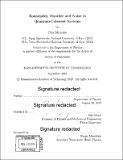Boundaries, disorder and noise in quantum-coherent systems
Author(s)
Shtanko, Oles.
Download1145019284-MIT.pdf (10.85Mb)
Other Contributors
Massachusetts Institute of Technology. Department of Physics.
Advisor
Seth Lloyd.
Terms of use
Metadata
Show full item recordAbstract
This thesis aims to understand how quantum-coherent phenomena in solids are affected by the presence of boundaries, disorder, and classical noise. First, we consider surface states in Dirac materials. We show that these systems can host ballistically propagating modes that are immune, to a large extent, to disorder at boundaries. Furthermore, in contrast to the conventional Tamm-Shockley states, Dirac surface states exist for generic boundaries, regardless of the boundary conditions specifics. Because of the robustness of surface states and their insensitivity to disorder, their contribution to transport dominates over the bulk contribution when the number of carriers is low enough. Our analysis was motivated by recent experimental observation pointing to existence of surface states propagating ballistically along imperfect boundaries. Second, we study quantum-coherent transport in the presence of strong classical noise. Noise usually plays a nemesis to quantum coherence; we find, however, that it can also result in new dynamical effects that are absent in noiseless isolated systems. In particular, at certain lengthscales, noise may lead to new collective behavior that involves the formation of vortices and Poiseuille flows. It is surprising that a quantum-coherent system can mimic the behaviors usually associated with hydrodynamic transport. We provide a detailed microscopic analysis of these phenomena and derive an equation describing such quasi-viscous flows. Our prediction of environmentally induced quasi-viscosity suggests new possible transport regimes accessible in solid-state devices, cold atomic systems, and photonic quantum simulators. Third, we study the stability of topological phases in strongly disordered periodically driven Floquet systems. Since the conventionally used perturbative expansions are insufficient in the presence of strong disorder, we are led to develop an approximate non-perturbative scheme, which is then applied to disordered Floquet systems driven at low frequency. We employ methods from the free probability theory to predict the bandgap in Floquet topological phases and to explore a disorder-induced gap-closing phase transition. Our analysis predicts the critical disorder value and critical exponents at the transition. The estimated critical disorder strength can be by order of magnitude larger than the bandgap, pointing to the extraordinary stability of topological phases in realistic experimental settings.
Description
Thesis: Ph. D., Massachusetts Institute of Technology, Department of Physics, 2019 Cataloged from PDF version of thesis. Includes bibliographical references (pages 131-143).
Date issued
2019Department
Massachusetts Institute of Technology. Department of PhysicsPublisher
Massachusetts Institute of Technology
Keywords
Physics.